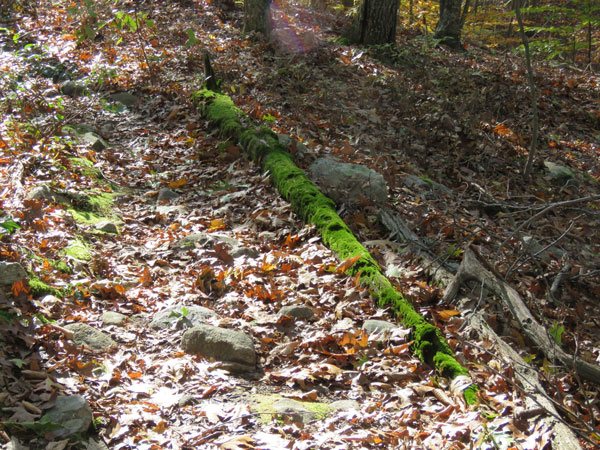
Ledyard, Connecticut
Kettles form when blocks of ice are broken off of the glacier and then buried in drift. When the retreating glacier melts, so does the block of ice, leaving a depression. Kettles can be very small and hard to find if they are obscured by foliage, and if the water remained in the hole, they can become lakes.
~ Jessica Cobb
(Connecticut’s Landscape Is the Story of Glaciers website)

it’s hard to see how far the land drops down beyond the wall
While trying to learn more about glacial erratics online I discovered kettles, and learned that we had one nearby. And so Tim & I were off to have a look at Kettle Hole in Ledyard. A loop trail circles along the perimeter. Well, it was very large and easy to find, even though it was obscured by foliage, and was not filled with water. Unfortunately, this kettle was not easy to capture in a photograph, its depth (perhaps about 50′ – 15m) just didn’t show up in a flat picture. Sigh.


All the same, we had a very pleasant walk on a lovely autumn day. And enjoyed photographing other things. We’ve had some rain here and there so our drought level has dropped to moderate, so we’re headed in the right direction.


it looked like a miniature fern growing out of and lying on top of the moss

All through autumn we hear a double voice: one says everything is ripe; the other says everything is dying. The paradox is exquisite.
~ Gretel Ehrlich
(The Solace of Open Spaces: Essays)





spotting these evokes sweet memories from my childhood
The green branchlets and stems of princess pines stay fresh-looking all winter, and they stand out prominently on the dry browns of a forest floor. Being evergreen like that may have contributed to the name, even though princess pines do not make pine cones. People often collect the tough, pliable plants and make Christmas wreaths and lush table arrangements out of them. They last a long time that way, despite the dryness of life on bare walls and tabletops. All you have to do is soak them in water for an hour or so to revive them. Although princess pines do a fine job of evoking holiday spirit, I do not want to encourage you to go out and collect great heaps of them every year. So many people are doing it already that some of these plants are in danger of being wiped out.
~ Curt Stager
(Field Notes from the Northern Forest)